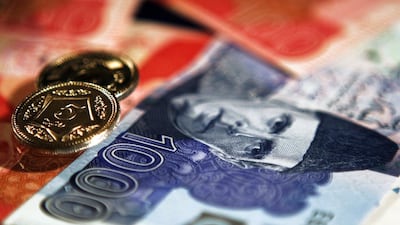S&P has downgraded Pakistan’s credit rating to B- as the country's economic outlook and external finances deteriorated.
Though the rating agency cut the South Asian country's rating to six levels below investment grade, it maintained a stable outlook on expectations Pakistan will be able to secure sufficient financing to meet its external debt obligations within the next 12 months.
"Pakistan's economic outlook, as well as its external position, have deteriorated well beyond our previous expectations,” the ratings agency said. "With the weaker economic settings, and limited progress in addressing fiscal imbalances following elections in mid-2018, we believe prospects for a rapid recovery in fiscal and external settings are now diminished,” it added.
Pakistan, which ranks among the top 20 Asian economies on the basis of nominal gross domestic product is saddled with debt with the country’s $8.12 billion foreign reserves way below the minimum level mandated by the World Bank and the International Monetary Fund. With current levels of reserves sufficient to meet only seven weeks’ worth of imports, Pakistan has been looking for cash injections and investments from its neighbours, notably China as well as Saudi Arabia and the UAE.
Islamabad is hopeful of securing as much as $30bn in investment from Riyadh and Abu Dhabi over the next couple of weeks, Pakistan's Board of Investment chairman Haroon Sharif told The National in an interview last month.
Investments are being courted into sectors such as renewable energy, mining, petrochemicals, real estate and agriculture, besides direct foreign investment into two separate refineries being developed in Pakistan by the Gulf states.
More modest growth prospects and limited reserve buffers will continue to challenge the country's external position, S&P said, even as the Pakistani government receives financial aid from various partners. Islamabad could see a change in fortune on its ratings if its economy materially outperforms expectations, and strengthens the country’s fiscal and external positions.
"Conversely, we may lower our ratings if Pakistan's fiscal, economic, or external indicators continue to deteriorate, such that the government's external debt repayments come under pressure,” S&P added.
Among the factors weighing down prospects for the growth and development of Pakistan's economy are protracted negotiations with the IMF, which the agency believes have put brakes on the reform timeline.
__________
Read more:
Pakistan eyes $30 billion investment from Saudi Arabia and UAE
UAE to deposit $3 billion in State Bank of Pakistan
__________
Pakistan, which has been a close ally of China in the region is set to receive around $2.5bn in deposits at its central bank from Beijing.
Islamabad is key to advancing Beijing's Belt and Road Initiative in the region, particularly through schemes worth multiple billions of dollars as part of the China Pakistan Economic Corridor infrastructure and logistics development plan.


